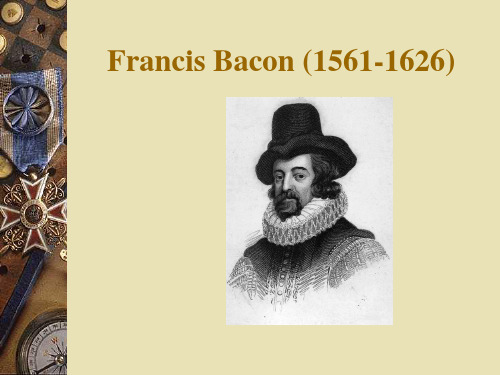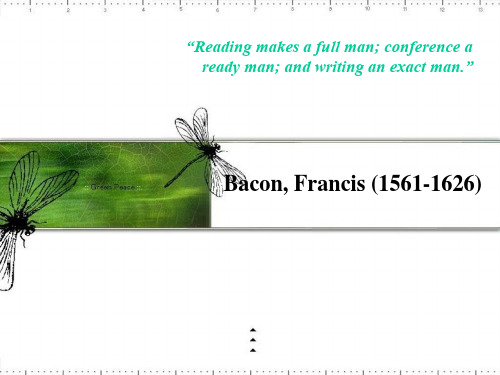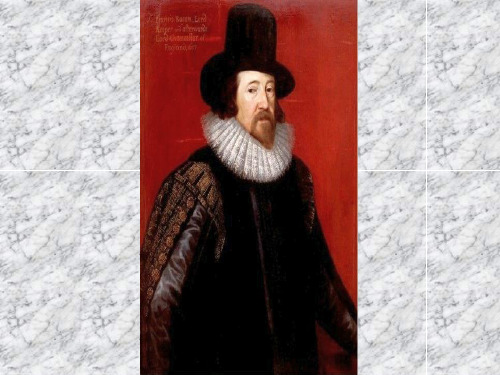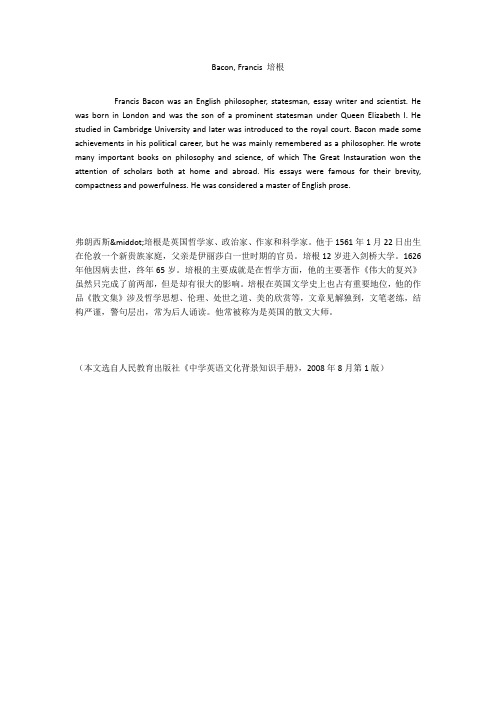英国文学史 Francis Bacon
英国文学选读_Francis Bacon弗朗西斯·培根

contenLeabharlann s Bacon’s Life Bacon’s Works Bacon’s Essays(《论说文集》) Quotes from Bacon’s Essays
Bacon’s Life
☻1561 January 22, born in London, the younger son of Sir Nicolas Bacon. ☻1573 April, enters Trinity college, Cambridge where he studies all the sciences then taught. ☻1579 Resides at Gray's Inn. Father's death leaves him penniless so he begins a career in law. ☻1584 Takes a seat in parliament for Dorsetshire. ☻1591 Confidential advisor to the earl of Essex. ☻1593 Takes a seat in parliament for Middlesex. ☻1597 Publishes his Essays《论说文集》along with Colours of Good and Evil and the Meditationes Sacrae.
Francis Bacon 弗朗西斯· 培根
22 January 1561 9 April 1626
18-year old Francis Bacon
An English lawyer, statesman, essayist, historian, philosopher(哲学家), and champion of modern science(现代科学拥护者).
英国文学6 Bacon

► 与朋友分享欢乐者,无不欢乐倍增;与朋友分享悲伤
Nuptial love maketh mankind; friendly love perfecteth it; but wanton love corrupteth, and embaseth it. ► 夫妻的爱,使人类繁衍。朋友的爱,给人以帮助。但那荒淫纵 欲的爱,却只会使人堕落!
First published in1597, it contained 10 short essays. Later more were added until finally 58 essays were included. These essays cover a wide variety of subjects concerning various aspects of life, such as love, truth, friendship, beauty, studies, riches, youth and age, death, and many others. They have won popularity for their precision, clearness, brevity and force. Almost on every subject Bacon had something original and interesting to say.
According to Bacon, man’s understanding consists of three parts: history to man’s memory, poetry to man’s imagination and creation, and philosophy to man’s reason.
Francis Bacon(英国文学课件)

• If the imaginative powers of literary creation of English Renaissance found their expression in the poetry of Spenser 风 格的and the drama of Shakespeare, the 格的 intellectual energy of this age showed itself in the achievement of Francis Bacon, English philosopher and statesman, one of the pioneers of modern scientific thought.
•
•
•
• Being unwittingly on his deathbed, the philosopher wrote his last letter to his absent host and friend Lord Arundel: • "My very good Lord,—I was likely to have had the fortune of Caius Plinius the elder, who lost his life by trying an experiment about the burning of Mount Vesuvius; for I was also desirous to try an experiment or two touching the conservation and induration of bodies. As for the experiment itself, it succeeded excellently well; but in the journey between London and Highgate, I was taken with such a fit of casting as I know not whether it were the Stone, or some surfeit or cold, or indeed a touch of them all three. But when I came to your Lordship's House, I was not able to go back, and therefore was forced to take up my lodging here, where your housekeeper is very careful and diligent about me, which I assure myself your Lordship will not only pardon towards him, but think the better of him for it. For indeed your Lordship's House was happy to me, and I kiss your noble hands for the welcome which I am sure you give me to it. I know how unfit it is for me to write with any other hand than mine own, but by my troth my fingers are so disjointed with sickness that I cannot steadily hold a pen."
英国文学Unit3 FrancisBacon

• Bacon’s Essays • What is essay?
– As a form of literature, the essay is a composition of moderate length, usually in prose, which deals in an easy, cursory way with the external conditions of a subject, and, in strictness, with that subject, only as it affects the writer.
• The essay was invented by Montaigne.
– Montaigne introduced the fashion of writing briefly, irregularly, with constant digressions and interruptions, about the world as it appears to the individual who writes. – Bacon offers his views on a whole smorgasbord of topics ranging from Truth, Death,' Adversitie', Marriage & the single life, Love, Boldness, Superstition, Friendship, Health, Ambition, Youth, Beauty to Anger & Fame.
• Pope called Bacon • "the wisest, brightest, and meanest of mankind." • His famous saying, "knowledge is power", is found in the Meditations.
英国文学选读课件Unit 3 Francis Bacon

VI Useful on-line references for further study
I Bacon’s position and contribution
II A brief introduction to Bacon's Essays
1. Actual size • a collection of essays • the first published book in 1597 with 10 essays • a much-enlarged second edition in 1612 with 38 essays • the third published book in 1625 with 58 essays.
• about rumination on the subject of marriage and single life with all its pros and cons.
2. Discourse analysis
• Bacon's point of view: - wives and children, - impediment to great enterprises, or great deeds; - not necessarily a bad thing, - a virtue for both the wife and the children and even for the society; - marriage a good thing on the whole.
and some few to be chewed and digested.” 书有可浅尝者,有可吞食者,少数则须咀嚼消化。
Bacon, Francis 培根

Bacon, Francis 培根Francis Bacon was an English philosopher, statesman, essay writer and scientist. He was born in London and was the son of a prominent statesman under Queen Elizabeth I. He studied in Cambridge University and later was introduced to the royal court. Bacon made some achievements in his political career, but he was mainly remembered as a philosopher. He wrote many important books on philosophy and science, of which The Great Instauration won the attention of scholars both at home and abroad. His essays were famous for their brevity, compactness and powerfulness. He was considered a master of English prose.弗朗西斯·培根是英国哲学家、政治家、作家和科学家。
他于1561年1月22日出生在伦敦一个新贵族家庭,父亲是伊丽莎白一世时期的官员。
培根12岁进入剑桥大学。
1626年他因病去世,终年65岁。
培根的主要成就是在哲学方面,他的主要著作《伟大的复兴》虽然只完成了前两部,但是却有很大的影响。
培根在英国文学史上也占有重要地位,他的作品《散文集》涉及哲学思想、伦理、处世之道、美的欣赏等,文章见解独到,文笔老练,结构严谨,警句层出,常为后人诵读。
Francis Bacon-英国文学史及选读
23: became M.P. for his eloquence and gradually established his reputation; found Earl Essex as his patron,who is Elisabeth’s favorite courtier. Later: offended the Queen by strongly opposing to some new taxes;managed to make the court sentence death to Essex by the crime of treason. 45: defended for the King’s taxes(James I) became Lord Keeper and then Lord Chancellor of England. 60: was accused of taking bribes in office,deprived of his seat in parliament , and fined ; after token imprisonments, Bacon retired in disgrace to spend the last five years of his life in the study of science and philosophy.
• professional works
• • Maxims of Law 《法律原理》 The Learned Reading upon the Statute of Uses (1642)《法令使用读本》
Essay: A Definition
• It is a relatively short literary composition in prose, in which a writer discusses a topic, usually restricted in scope, or tries to persuade the reader to accept a particular point of view. • the term essai was first applied to the form in 1580 by Montaigne, one of the greatest essayists of all time, to his pieces on friendship, love, death, and morality. In England the term was inaugurated in 1597 by Francis Bacon, who wrote shrewd meditations on civil and moral wisdom.
英国文学史2 Bacon
Professiona works
Maxim of the Law 法律箴言 Reading on the Statue of Uses 论使用法则
Comments on his essays:
1. His literary form is new to the English audience. Bacon borrowed his name from French writer Montaigne. 2. His essays cover a variety of subjects ranging from abstract subjects such as “the meaning of truth” and “the composition of beauty” to concrete, practical matters such as “friendship”, “marriage” etc. 3. These essays, though short, are sinewy, full of wisdom, and elegantly phrased. 4. His essays offer people a new attitude towards life and death, a stronger desire to explore the unknown fields of knowledge, and a better understanding of one’s inner self in relation to the outside world.
12 He went to Cambridge 16 He took up law 17 He was in France in the train of English ambassador, and his father died 26 He was elected to Parliament 42 James I came to England and he received a knighthood and later becam a peer:( duke, marquis, earl or count, viscount, and baron) 51-60 He worked hard and developed to Lord High Chancellor 65 He died
英国文学 Francis Bacon
• These essays cover a wide variety of subjects, such as love, truth, friendship, parents and children, beauty, studies, riches, youth and age, garden, death and many others. Among these essays, the famous pieces are Of Studies, Of Travel and Of Wisdom.
“真理是什么东西?”①彼拉多当年玩世不恭地取笑说,他提这个问题是不指望得到答案的。世人多 数心随境变②,他们认为坚持一种信念就等于自戴一种枷锁,会使思想和行为无法自行其事。虽然作 为一种学派的怀疑论早已消逝,但持这种观点者却仍大有人在——尽管他们的观念未必像古人那样清 晰而透彻。使人们宁愿追随诡言,而不去追求真理的原因,不仅由于探索真理艰苦的,也不仅由于真 理会约束人的幻想,而且是由于诡言更能迎合人性中的那些恶习。后期希腊有一位哲学家③曾探讨过 这个问题,因为他不能理解,为什么一些欺世诡言竟能如此迷人,尽管它们即非像诗歌那样优美,又 不像经商那样能使人致富。我也不懂这究竟是为什么——难道人们仅仅是为了爱好虚假而追求虚伪吗? 也许因为真理好像阳光,在它照耀下人世间所上演的那种种假面舞会,远不如在半明半暗的烛光下会 幻而华丽。对世人来说,真理犹如珍珠,它要在阳光的照耀下才变得明亮。真理不是那种红玉或钻石, 需要借助摇曳不定的烛光而幻化出五色缤纷的浮光。真真假假的诡言会给人带来愉快。假如一旦把人 们内心中那种种虚荣心、虚妄的自我估计、各种异想天开的揣想都清除掉,许多人的内心将会显露出 原来是多么的渺小、空虚、丑陋;以至连自己都要感到厌恶。对这一点,难道有谁会怀疑吗?曾有先 哲责备“诗”,诬之为“魔鬼迷幻药酒”④,因为诗不仅出自幻想,而且其中总有虚幻的成分。但其 实诗又怎能比谬误更为诱惑人呢?真正可怕的,还不是那种人人难免的一念之差,而是那种深入习俗 盘踞于人心深处的谬误与偏见。尽管人世腐败,但只要人接触到真理,还是不能不被真理所征服。因 为真理既是衡量谬误的尺度,又是衡量自身的迟度。神圣的教义是——追求真理而与之同在,认识真 理要敢于面对,更要信赖真理而对之皈依,这才是人性的崇高境界。在上帝创世的最初日子里,他首 先创造了光——第一是知觉,其次是理智,最后赐给人类以良知的心智之光⑤。上帝把光明赐予浑沌 的物质世界,又在安息日以光明照亮了人类的心灵,并且至今他还把神圣的光辉赐予他所恩宠的那些 选民。有一派感性主义哲学在许多方面是肤浅的,但其中一位诗人⑥却由于向往真理而流芳于世。他 曾说过:“居高临下遥看颠簸于大海中的航船是愉快的,站在堡垒中遥看激战中的战场也是愉快的, 但是没有能比攀登于真理的高峰之上,而俯视尘世中的种种谬误与迷障、烟雾和曲折更愉快了!”— —只要作这种俯看者不自傲自满,那么这些话的确说得好极了!是啊,一个人如能在心中充满对人类 的博爱,行为遵循崇高的道德律,永远只围绕真理的枢轴而转动,那么他虽在人间也就等于步入天堂 了。以上谈了神学和哲学方面的真理,还要再谈谈实践的真理。甚至那些根本不相信真理存在的人, 也不能不承认光明正大是一种崇高的德性。伪善正如假币,也许可以骗取到货物,但它毕竟不能体现 真正的价值。欺诈的行为像蛇,它无法用足站立,而只能靠肚皮爬行⑦。没有任何罪恶比虚伪和背叛 更可耻了!所以蒙田⑧在研究“骗子”这个词为何如此可憎时说得好:“深思一下吧!说谎者是这样 的一类人,他敢于狂妄地面对上帝,却不敢勇敢地面对世人!”正是如此!曾经有一个预言,说基督 返回人间时那刻,就是在大地上找不到诚实者的时刻——而谎言就是请求上帝来执行末日审判的丧钟 之声。对于虚伪和欺诈者们,这乃是一个严肃的警告啊!
Francis Bacon
文史地位与贡献
• 培根是17世纪初杰出的散文家,也是近 代科学和唯物主义哲学的创始人之一, 他一生致力于发现知识的各个领域,声 称要将全部知识作为研究对象,并提出 了一系列向宗教思想挑战的科学调查研 究方法。培根是文艺复兴时期英国多才 多艺者的代表,在政治、哲学、科学和 文学领域均有建树。但他学问做的深邃, 人品却不高,因而蒲柏评价他是“人类 最聪明、最涅在他研究为什么说人 说谎算是这样一种耻辱,一种可 恨之极的罪责的时候,说的极好。 他说:“仔细考虑起来,要是说 某人说谎就等于说他对上帝很大 胆,对世人很怯懦。”因为谎言 是直对着上帝而躲避着世人的。
Of Studies
• Reading makes a full man, conference a ready man, and writing an exact man. And therefore, if a man write little, he had need a great memory; if he confer little, he had need have a present wit; if he read little. He had need have much cunning, to seem to know that he doth not.
Francis Bacon
Francis Bacon
Personal details Born 22 January 1561 Strand, London, England Died 9 April 1626 (aged 65) Highgate, Middlesex, England Nationality English Alma mater:Cambridge University Signature
- 1、下载文档前请自行甄别文档内容的完整性,平台不提供额外的编辑、内容补充、找答案等附加服务。
- 2、"仅部分预览"的文档,不可在线预览部分如存在完整性等问题,可反馈申请退款(可完整预览的文档不适用该条件!)。
- 3、如文档侵犯您的权益,请联系客服反馈,我们会尽快为您处理(人工客服工作时间:9:00-18:30)。
wisdom without them, and above them, won by observation. Read not to contradict and confute, nor to believe and take for granted, nor to find talk and discourse, but to weigh and consider. Some books are to be tasted, others to be swallowed, and some few to be chewed and digested; that is, some books are to be read only in parts; others to be read, but not curiously; and some few to be read wholly, and with diligence and attention. Some books also may be read by deputy and extracts made of them by others, but that would be only in the less important arguments and the meaner sort of books; else distilled books are like common distilled waters, flashy things. Reading maketh a full man, conference a ready man, and writing an exact. And therefore, if a man write little, he had need have a great memory; if he confer little, he had need have a present wit; and if he read little, he had need have more cunning, to seem to know that he doth not.
Histories make men wise, poets, witty; the mathematics, subtle; natural philosophy, deep; moral, grave; logic and rhetoric, able to contend. Abeunt studia in mores. Nay, there is no stond or impediment mores. in the wit but may be wrought out by fit studies, like as diseases of the body may have appropriate exercises. Bowling is good for the stone and reins, shooting for the lungs and breast, gentle walking for the stomach, riding for the head, and the like. So if a man’s wit be wandering, let him study the mathematics; for in demonstrations, if his wit be called away never so little, he must begin again. If his wit be not apt to distinguish or find differences, let him study the schoolmen, for they are Cymini sectores. If he be not able to beat sectores. over ma to prove and illustrate another, let him study the lawyer’s cases. So every defect of the mind may have a special receipt.
Of Studies Studies serve for delight, for ornament, and for ability. Their chief use for delight is in privateness and retiring; for ornament, is in discourse; and for ability, is in the judgment and disposition of business. For expert men can execute, and perhaps judge of particulars, one by one; but the general counsels, and the plots and marshaling of affairs, come best from those that are learned. To spend too much time in studies is sloth; to use them too much for ornament is affectation; to make judgment wholly by their rules is the humor of a scholar. They perfect nature, and are perfected by experience; for natural abilities are like natural plants, that need pruning by study; and studies themselves go give forth directions too much at large, except they be bounded in by experience. Crafty men contemn studies, simple men admire them, and wise men use them, for they teach not their own use; but that is a
Francis Bacon
Bacon was of noble birth, and from an early age was attached to Elizabeth’s court. Elizabeth’ At twelve he went to Cambridge, and after graduating at 16 he took up law. At 17 he was in France in the train of the English ambassador. After his father’s death, father’ Bacon had to work out his own career. At 26, he was elected to Parliament. He did his best to draw the favorable attention of the Queen, but without much success. In the reign of James I, Bacon obtained an important office of state. He was an admirable judge, but in the course of his rising he had made enemies who finally combined to bring against him charges of bribery and the betrayal of justice. Five years after he was banished from London, he died. The remaining years of his life were spent in literary and philosophical work.
《论读书》赏析 论读书》 《论读书》详细讨论了读书的目的和功用, 论读书》 分析了世人对读书的不同态度,介绍了读书 的各种方法。文章写于17世纪,行文简约, 的各种方法。文章写于17世纪,行文简约, 略带古风而又明白畅达。培根采用排比修辞 手法,文中警句叠出,如“ 手法,文中警句叠出,如“读书足以怡情, 足以博采,足以长才,”“读史使人明智, 足以博采,足以长才,”“读史使人明智, 读诗使人灵秀,数学使人周密,科学使人深 刻,伦理使人庄重,逻辑修辞之学使人善辩, 凡有所学,皆成性格,” 凡有所学,皆成性格,”已成为家喻户晓的 名言。作为一名熟谙世故、饶有见识、讲究 实用的哲人和政治家,培根强调读书方法要 得当,不能死读书。他告戒我们:“ 得当,不能死读书。他告戒我们:“用书之 智不在书中,而在书外,全凭观察得之。” 智不在书中,而在书外,全凭观察得之。” 文章充分体现了培根的风格,有一种正襟危 坐、谈经论道之势。他文笔简练,说理准确, 不论以小喻大或以大喻小,都能鞭辟入里, 字里行间闪烁着智慧的光芒。《论读书》 字里行间闪烁着智慧的光芒。《论读书》文 风古雅,紧凑庄重,不失为英语精品之作, 值得读者仔细玩味。
Main works of Bacon
Philosophical works: The Advancement of Learning 学术的进展 The Novum Organum 求学之新器 The De Augmentis 新工具 Literary works: Essays 随笔 Professional works: Maxims of the Law 法律准则 Reading on the Statute of Uses 谈使用法则
